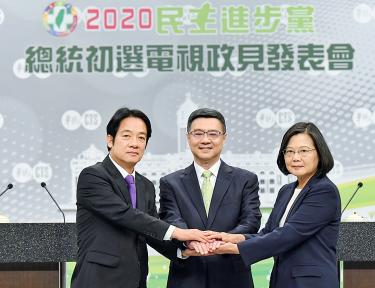President Tsai Ing-wen (蔡英文) and former premier William Lai (賴清德) yesterday faced off in a televised platform presentation as part of the Democratic Progressive Party’s (DPP) presidential primary, with Tsai again urging Lai to join her as her running mate and Lai calling on Tsai to “pass the baton.”
The presentation comprised of three sections in which the two elaborated on their primary bids, answered questions from three panelists and gave concluding remarks.
Lai was the first to speak, as determined by a draw conducted at a meeting on Monday.
The DPP is at its most difficult moment and the nation at its most precarious stage, so if the party lost the government, it could cost the nation its sovereignty, he said.
Therefore, he decided to participate in the primary driven by his passion for the nation and in the hope of ensuring a bright future for it, Lai said.
Taiwan is a democracy in which the transition of political power is decided by the people, so allegations that he had staged a “coup” or an “ambush” against Tsai were baseless, he said.
While he does not think that the DPP’s governance over the past three years has been a failure, its landslide defeats in last year’s local elections signaled that people are no longer willing to wait eight years before passing their judgement on a government’s performance, Lai said.
He urged the party to stand up to the test voters had put it to and show the wisdom of running a “relay race.”
If elected president, he would steadfastly reject the “one country, two systems” framework that Chinese President Xi Jinping (習近平) seeks to impose on the nation, and develop the nation’s defense capabilities and conduct military exchanges with the US to ensure that Taiwan retains its advantageous position in the first island chain, Lai said.
He would establish a ministry of homeland security and push for an anti-infiltration law to address the issue of Chinese flags becoming “ubiquitous” on the streets of Taiwan, he added.
Lai said that he would seek to improve mutual understanding on the two sides of the Taiwan Strait and extend the nation’s goodwill toward China on the premise that Taiwan is a sovereign and independent nation.
He would also push for judicial reform; give young people a future by making Taiwan a Chinese-English bilingual nation, thereby boosting their competitiveness at work; implement experimental education and cultivate teacher-student partnerships in vocational education; introduce a grace period in which student loans need not be repaid; and raise property taxes on people owning at least three homes, he said.
Tsai compared her governance to a construction project and said that not only does she have a blueprint, but she is already on the way to erecting the building.
Taiwan’s partnerships with other nations have become ever closer since she took office, Tsai said, citing the renaming of the Taiwan Council for US Affairs and the Taiwan-Japan Relations Association.
Taiwan is no longer a “troublemaker” in the international community, but a “good partner” and a positive force that helps to maintain regional peace, she said.
She has never willingly compromised the nation’s sovereignty under international pressure, Tsai said.
Domestically, she has withstood pressure when pushing policies to pursue transitional justice; implement pension reforms for civil servants, public-school teachers and military personnel; and abolish the 18 percent preferential interest rate for civil servants, she said.
She has launched a project to domestically build submarines — something her predecessors wanted to do, but could not, Tsai said.
Other reforms she had set in motion include energy transformation and the “five plus two” industrial transformation initiative, with the latter having propelled the value of the nation’s machinery and Internet of Things sectors past the NT$1 trillion (US$31.83 billion) mark, she said.
“Brother Ching-te [Lai’s Chinese name], please refrain from saying: ‘Only I can win 2020.’ The truth is one plus one will definitely be greater than two,” Tsai said in her closing remarks.
“Let us work together for the sake of uniting the DPP and winning the election, which is greater than the two of us,” she added.
Lai, in his concluding remarks, said it is important that who represents the first “one” in the equation Tsai cited.
Source: Taipei Times - 2019/06/09





















